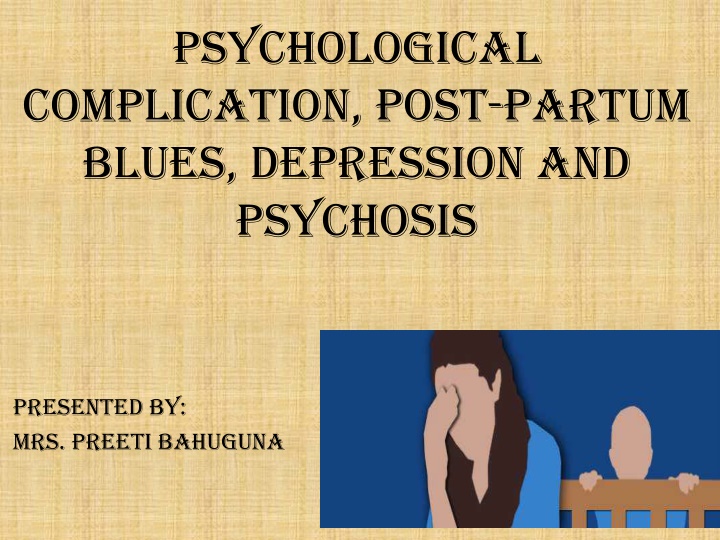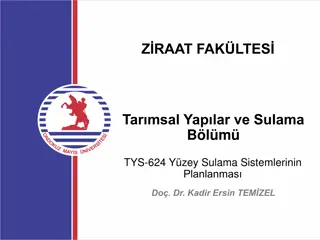
Postpartum Psychological Complications and Adaptation Phases
Explore the psychological complications that can arise during the postpartum period, including post-partum blues, depression, and psychosis. Learn about the phases of maternal adaptation identified by researcher Reva Rubin, and the importance of letting go and redefining roles during recovery. Discover high-risk factors for postpartum illness and the significance of family history and past psychiatric conditions.
Download Presentation

Please find below an Image/Link to download the presentation.
The content on the website is provided AS IS for your information and personal use only. It may not be sold, licensed, or shared on other websites without obtaining consent from the author. If you encounter any issues during the download, it is possible that the publisher has removed the file from their server.
You are allowed to download the files provided on this website for personal or commercial use, subject to the condition that they are used lawfully. All files are the property of their respective owners.
The content on the website is provided AS IS for your information and personal use only. It may not be sold, licensed, or shared on other websites without obtaining consent from the author.
E N D
Presentation Transcript
psychological complication, post-partum blues, depression and psychosis Presented by: Mrs. Preeti bahuguna
Introduction Puerperium period is a time of transition from non-parenthood to parenthood. Parent infant attachment lead to bonding depending on infant s responsivness.This courage them to continue interaction.
During later recovery the mother must let go and view the child as a separate person. Those women who have difficulty letting others assist with care of her child may develop psychological problems.
Psychological adaptation during postpartum Mother adjustments during the postpartum period. Reva Rubin, a researcher who examined maternal adaptation to childbirth in the 1960s, identified three phases that can help the nurse understand maternal behavior after delivery. typically undergo psychological
Historically, each phase encompassed a specific time span and women progressed through phases sequentially. Rubin s Stages of adaptation:- 1- Taking in phase(dependent phase):- First 3 days post partum. Focused on self ,not infant, on her own needs for sleep & rest. Passive , dependent & can t make decisions. Need to discuss labor experiences. Sense of wonderment when looking at the neonate. maternal psychological
2-Taking hold phase (dependent to independent phase):- Last from the 3rd to 10th day postpartum. Focus on infant. Active, independent & can make decisions. Initiates self care activities, focus on bowels, bladder & breastfeeding. Responds to instruction about infant care & self care. May express lack of confidence in caring for the neonate.
3-Letting go- (interdependent phase):- Last from 10 days to 6 weeks postpartum. The woman finally redefines her new role. See self as separate from infant. Gives up fantasized image of her child and accepts the real one. Readjustment.
High risk factors for post partum illness Family history, major mental illness Past history psychiatric illness Present pregnancy neonatal complication Unmet expectation of mother caesarean delivery,
Postpartum Blues Many women experience a period of blues or mild depression following delivery. Although unpleasant, this is a normal and expected reaction following any major event in one s life to include delivery. experienced as distressful and
In the vast majority of cases, this experience of postpartum blues does not cause major problems, does not interfere with taking care of your newborn, and goes away without treatment within 2 weeks. If these feelings continue for much longer or if you become concerned, it is always okay to ask your health care assistance, advice, behavioral health services. professional referral for or to local
causes Postpartum Blues are caused by a number of factors 1. Hormonal rebalancing after delivery 2. Major life events cause stress (even if these events are joyous occasions) and stress can often show itself in the form of mild depressive symptoms.
Sign and symptoms Symptoms are mild and short term. Should subside after 2 to 3 weeks.
Symptoms: Sadness, anxiety, irritability Uncontrollable tearfulness Wide mood swings Occasional negative thoughts
Treatment Treatment supportive care and reassurance about the transient nature of the condition. (when necessary) includes
Post-partum depression Depression is twice a common in women as it is in men, with its peak incidence during the primary reproductive years (25 to 45). Between 10-25% of women in US population are likely to experience at least one Major Depressive Episode over the course of their lifetime. At any given time, between 5% and 9% of women in the US are suffering from Major Depressive Disorder.
Between 5-12% of men in the US population are likely to experience at least one Major Depressive Episode over the course of their lifetime. At any given time, between 2% and 3% of men in the US are suffering from Major Depressive Disorder. It is estimated that fewer than 25 % of patients suffering from depression are actually under the care of a mental health specialist.
A more severe form of postpartum blues Affects 10 to 15% of new mothers Affects 26 to 32% of all adolescent new mothers Symptoms are more intense and longer lasting
Who is at risk? Family History especially a personal prior episode of depression Mother experiencing poor marital relationship/abusive relationship Lack of social support and/or child care stressors Comorbidities of substance abuse, anxiety or somatization disorders
Sign and symptoms Difficulty concentrating or making decisions Psychomotor agitation or retardation Fatigue Changes in appetite and/or sleep patterns Recurrent thoughts of death or suicide
Feelings of worthlessness or guilt (especially focusing on failure at motherhood) Excessive anxiety Frequently focusing on the child s health
Postpartum Depression Interventions Medication For more severe or chronic symptoms Prior episodes or family histories w/ good response to meds Less costly and less time consuming Psycho-therapy Chronic psychosocial problems Incomplete response to meds Concurrent personality problems Combination of both
Post-partum psychosis Psychosis is what most people think of when they hear the word crazy. It means hearing voices or seeing things that aren t there. Other psychotic symptoms include bizarre and irrational beliefs that may include a firmly held belief that others are trying to harm the person or those close to them.
In cases of postpartum psychosis, a mother may say things that sound irrational. Others may interpret what she is saying as bizarre or weird. Psychosis exceptionally unlikely that new mothers (even those experiencing postpartum depression) will develop psychotic symptoms. is extremely rare and it is
Rare condition, affecting 1 to 2 out of 1000 women after childbirth Presentation can be dramatic Onset as early as 48 to 72 hours postpartum Symptoms develop within the first 2 weeks after delivery
Sign and symptoms Early Symptoms -Restlessness -Irritability -Sleep disturbance
Progressive Symptoms Depressed or elated mood Disorganized behavior Mood swings/ instability Delusions Hallucinations
Treatment Post partum psychosis is considered as mental health emergency and therefore requires attention. Antipsychotic drugs and anti-depressant drugs. If the mother poses a threat to herself and other she likely be hospitalized for short time. Psychological support.
Nursing management
Nursing intervention toward psychological changes & disorders during postpartum period:- 1- Early detection of any behavioral and psychological responses changes. 2-Early detection of depression-anger or blues. 3- Early detection of male adaptation in attachment. 4- Refer the client to obstetrician to evaluate physiological status. 5- Support positive parenting behaviors.
6- Refer the client to:- Psychiatrist. Nurse psychotherapist Pediatrician. Support group. Public health nurse.
Research article Tukaram B. Zagade, Prasanna Deshpande To assesse the level of depression among post natal mother admitted in Krishna hospital. To associate the results with demographic variables. To prepare a hand book on prevention of postnatal depression. Methodology: The research methodology indicates the general pattern to gather valid and reliable data for the problem under investigation57 The present study was aimed to assess the level of post natal depression among the post natal mothers through assessment of mothers by Eden Burg Scale. It includes the research design, setting of the study, population, sample and sample size, sampling technique, development of the tool, method of data collection and plan for data analyze. A study conducted by
Results & Conclusion: The distribution of demographic characteristics, of the postnatal mothers are more observed in age group of (21 to 25) i.e. 63%, it was observed that a large majority (87.9%) were Hindus, As per occupation( 85%) women s are housewife, many mothers belong to joint family (67%) ,normal delivery were (75.6%).It was observed that 21-25 age group of post natal mothers were more prevalent to have post natal depression among 60 samples taken. No association was seen with religion, It was observed that high school educated post natal mothers were more .Prevalence was seen more in them. Postnatal mothers were more from joint family taken. Prevalence was seen more in them too. No prevalence was seen between sex of child .There was no any association It was observed that normal delivery were more than L.S.C.S. The prevalence of postnatal depression was more among them within 60 samples taken from maternity ward of Krishna Hospital, Karad



